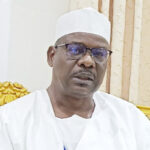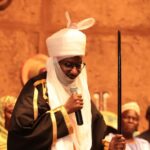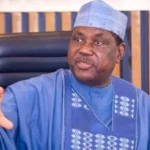I guess many of those from the northern part of the country would probably know the first graduate from that part. Without any hesitation, that would rightly be, Dr. R. A. B. Dikko. He was also the first medical doctor from the North, having graduated from the University of Birmingham in 1939.
He came to prominence when he served as the first indigenous permanent secretary in the Northern Region’s Ministry of Health and became even more well-known when he was appointed a minister in General Yakubu Gowon’s cabinet. But ask for the name of the second person to graduate from the northern part of the country and all you would get would be some dumb looks.
He was John Mamman Garba who graduated from the London School of Economics in the summer of 1950. Among the most accomplished citizens of that bygone era, he would probably be the only one that left a memoir that gave so many details of his life. The book he wrote, The Time Has Come – – Reminiscences and Reflections of a Nigerian Diplomat, was completed just before he died in 1989. The book was launched in that period in Kano with General Gowon as the guest of honour. It’s always a delight to go back to read this book because it contained so much of life as it was, in places I also grew up knowing intimately, Maiduguri, Kano, and Zaria.
Mamman Garba wrote the book drawing from acute memory and a 60-year habit of keeping a diary. He wrote the book in an engaging style, in fluid, impeccable English. The book traced his life from Geidam in present-day Yobe State where he was born in 1919 within a family that has led a peripatetic existence for generations.
He wrote: “My people were originally Kanuri who lived in some unspecified part of present-day Borno State. Owing to some untoward circumstances, there was a large exodus a long time ago, including members of my own family. They moved westwards until they reached Katsina.” His grandfather had escaped the Jihadist conquest of Katsina in the early 19th Century, to go north-eastwards to settle in Geidam.
When he was a kid, his father had to move to seek greener pastures in Maiduguri then coming up as the capital of Borno province. His father took him along to Maiduguri where they lived for a while in a place called Maisandari, an outlying site south of Maiduguri which had grown from being a place where freed slaves were kept after the British occupation, before being transferred to Zungeru.
At the time Mamman Garba lived there, it was a flourishing suburb serving as a reservoir from which messengers, house-boys, and general-purpose labourers were drawn. The place was eventually demolished during the 2nd World War for the practical reason of expanding the Pompomari airport, then becoming a staging post for airlifting men and material to the allied forces in East and North Africa. The Maisandari inhabitants were thereafter dispersed into Bulabulin and Bullumkuttu wards.
Then his father, still seeking greener pastures, moved to Kano in 1926 and settled in Bompai quarters. His father was ahead of his time and due to acquaintances with colleagues who had served in the First World War and were widely travelled, got the idea of enlisting young Mamman Garba in a school.
There was a CMS Bookshop school run by a Briton in their street and his father got him registered there. It was a defining moment for Mamman Garba as from thence he was completely sucked into a different world. It was the beginning of his formal education and it was rapid. He had the best of tutelage from his British mentors, initially Rev James Cotton and his wife, and later the legendary Dr. Walter Miller.
It was a turning point in his life exposing him to the most unimaginable episodes for a child of that era. In a year or two in the CMS Bookshop school, he was the only child selected from the North to represent the country along with 29 others from the South, at the third World Boy Scout Jamboree in Liverpool England held from June to September 1929.
When he returned, he was sent to St. Bartholomew’s School in Wusasa Zaria from where he proceeded to CMS Grammar School Lagos, reputedly the first secondary school in Nigeria, established in 1839. He was also a foundation student of the famous Igbobi College on Ikorodu Road in Lagos which started in 1932.
Despite having gotten qualifications for university education in 1934, Mamman Garba was stuck in jobs in the agricultural sector till 1947 when he got a scholarship from the Nuffield Foundation to proceed to the London School of Economics in the UK. After graduating in 1950 with BSc in Economics, he returned to the agricultural sector for some years before he was appointed into the new Nigerian Foreign Service.
He had an eventful career in the Foreign Service where he represented this nation in many parts of the world, finishing as our Ambassador to the USA from 1972-75.
We shall return to the subject next week to share his snippets of life in Maiduguri and Kano in the 1920s as well as other impressions on national issues.
 Join Daily Trust WhatsApp Community For Quick Access To News and Happenings Around You.
Join Daily Trust WhatsApp Community For Quick Access To News and Happenings Around You.


